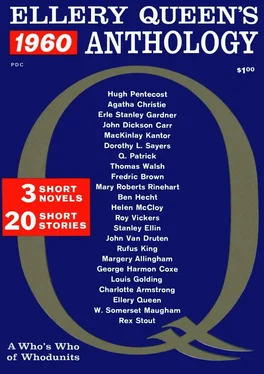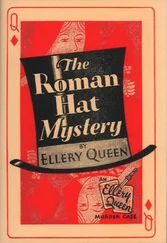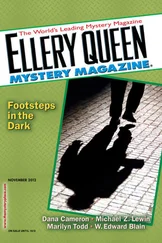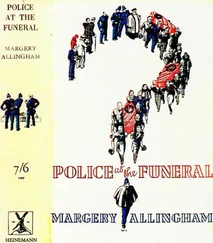“Father, you’ve got to listen to me,” Erika said.
“I have been listening to you,” Mike said, “for the last five minutes.”
William came in with the first-aid kit.
“Do what you can for her, William,” Mike said. Then he turned and walked slowly and steadily away into the library.
I went after him. He was standing by the fireplace, looking down into the dead coals in the grate.
“I’m sorry, Mike,” I said.
He didn’t answer, for a moment. Then he whirled around on me. “What’s the matter with me?” he cried. “People are my business! I’m supposed to know people — understand them! Until I heard her talking I’d never seen her before in my life.”
“Maybe you just saw her as a replica of somebody else,” I said. “Because you wanted it that way so badly.”
He reached out to me. “Vance, do you suppose Joan will ever understand? Is there any way I can ever make it up to her?”
“I wouldn’t be surprised,” I said. “She’s quite a girl.”
Agatha Christie
The Mystery of the Blue Jar
In Agatha Christie’s work the unusual is usually the usual... In this story a young man hears a woman’s voice scream: “Murder — help! Murder!” — a not unusual situation in mystery fiction; but when everyone else within earshot denies having heard any cry for help, Agatha Christie is back in her usual form — contriving the unusual...
Jack Hartington surveyed his topped drive ruefully. Standing by the ball, he looked back to the tee, measuring the distance. His face was eloquent of the disgusted contempt which he felt. With a sigh he drew out his iron, executed two vicious swings with it, annihilating in turn a dandelion and a tuft of grass, and then addressed himself firmly to the ball.
It is hard when you are twenty-four years of age, and your one ambition in life is to reduce your handicap at golf, to be forced to give time and attention to the problem of earning your living. Five and a half days out of the seven saw Jack imprisoned in a kind of mahogany tomb in the city. Saturday afternoon and Sunday were religiously devoted to the real business of life, and in an excess of zeal he had taken rooms at the small hotel near Stourton Heath links, and rose daily at the hour of six a.m. to get in an hour’s practice before catching the 8:46 to town.
The only disadvantage to the plan was that he seemed constitutionally unable to hit anything at that hour in the morning. A foozled iron succeeded a muffed drive. His mashie shots ran merrily along the ground, and four putts seemed to be the minimum on any green.
Jack sighed, grasped his iron firmly and repeated to himself the magic words, “Left arm right through, and don’t look up.”
He swung back — and then stopped, petrified, as a shrill cry rent the silence of the summer’s morning.
“Murder,” it called. “Help! Murder!”
It was a woman’s voice, and it died away into a sort of gurgling sigh.
Jack flung down his club and ran in the direction of the sound. It had come from somewhere quite near at hand. This particular part of the course was quite wild country, and there were few houses about. In fact, there was only one near at hand, a small picturesque cottage, which Jack had often noticed for its air of old world daintiness. It was towards this cottage that he ran. It was hidden from him by a heather-covered slope, but he rounded this and in less than a minute was standing with his hand on the small latched gate.
There was a girl standing in the garden, and for a moment Jack jumped to the natural conclusion that it was she who had uttered the cry for help. But he quickly changed his mind.
She had a little basket in her hand, half-full of weeds, and had evidently just straightened herself up from weeding a wide border of pansies. Her eyes, Jack noticed, were just like pansies themselves, velvety and soft and dark, and more violet than blue. She was like a pansy altogether, in her straight purple linen gown.
The girl was looking at Jack with an expression midway between annoyance and surprise.
“I beg your pardon,” said the young man. “But did you cry out just now?”
“I? No, indeed.”
Her surprise was so genuine that Jack felt confused. Her voice was very soft and pretty with a slight foreign inflection.
“But you must have heard it,” he exclaimed. “It came from somewhere just near here.”
She stared at him.
“I heard nothing at all.”
Jack in his turn stared at her. It was perfectly incredible that she should not have heard that agonised appeal for help. And yet her calmness was so evident that he could not believe she was lying to him.
“It came from somewhere close at hand,” he insisted.
She was looking at him suspiciously.
“What did it say?” she asked. “Murder — help! Murder!”
“Murder — help, murder,” repeated the girl. “Somebody has played a trick on you, Monsieur. Who could be murdered here?”
Jack looked about him with a confused idea of discovering a dead body upon a garden path. Yet he was still perfectly sure that the cry he had heard was real and not a product of his imagination. He looked up at the cottage windows. Everything seemed perfectly still and peaceful.
“Do you want to search our house?” asked the girl drily.
She was so clearly sceptical that Jack’s confusion grew deeper than ever. He turned away.
“I’m sorry,” he said. “It must have come from higher up in the woods.”
He raised his cap and retreated. Glancing back over his shoulder, he saw that the girl had calmly resumed her weeding.
For some time he hunted through the woods, but could find no sign of anything unusual having occurred. Yet he was as positive as ever that he had really heard the cry. In the end, he gave up the search and hurried home to bolt his breakfast and catch the 8:46 by the usual narrow margin of a second or so. His conscience pricked him a little as he sat in the train. Ought he not to have immediately reported what he had heard to the police? That he had not done so was solely owing to the pansy girl’s incredulity. She had clearly suspected him of romancing — possibly the police might do the same. Was he absolutely certain that he had heard the cry?
By now he was not nearly so positive as he had been — the natural result of trying to recapture a lost sensation. Was it some bird’s cry in the distance that he had twisted into the semblance of a woman’s voice?
But he rejected the suggestion angrily. It was a woman’s voice, and he had heard it. He remembered looking at his watch just before the cry had come. As nearly as possible it must have been five and twenty minutes past seven when he had heard the call. That might be a fact useful to the police if... if anything should be discovered.
Going home that evening, he scanned the evening papers anxiously to see if there were any mention of a crime having been committed. But there was nothing, and he hardly knew whether to be relieved or disappointed.
The following morning was wet — so wet that even the most ardent golfer might have his enthusiasm damped. Jack rose at the last possible moment, gulped his breakfast, ran for the train and again eagerly scanned the papers. Still no mention of any gruesome discovery having been made. The evening papers told the same tale.
“Queer,” said Jack to himself, “but there it is. Probably some blinking little boys having a game together up in the woods.”
He was out early the following morning. As he passed the cottage, he noted out of the tail of his eye that the girl was out in the garden again weeding. Evidently a habit of hers. He did a particularly good approach shot, and hoped that she had noticed it. As he teed up on the next tee, he glanced at his watch.
Читать дальше












